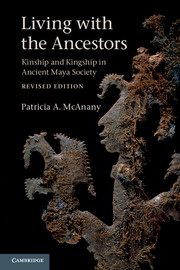Book contents
- Frontmatter
- Dedication
- Contents
- Figures and Table
- Preface
- Living with the Ancestors: Kinship and Kingship in Ancient Maya Society
- Introduction to the Revised Edition
- ONE A Point of Departure
- TWO Ancestor Veneration and Lineage Organization in the Maya Region
- THREE Creating a Genealogy of Place
- FOUR Lineage as a Crucible of Inequality
- FIVE Kin Groups and Divine Kingship in Lowland Maya Society
- SIX Ancestors and Archaeology of Place
- POSTSCRIPT The Future of the Ancestors and the Clash between Science and Human Rights
- Notes
- References Cited
- Index
FIVE - Kin Groups and Divine Kingship in Lowland Maya Society
Published online by Cambridge University Press: 05 July 2014
- Frontmatter
- Dedication
- Contents
- Figures and Table
- Preface
- Living with the Ancestors: Kinship and Kingship in Ancient Maya Society
- Introduction to the Revised Edition
- ONE A Point of Departure
- TWO Ancestor Veneration and Lineage Organization in the Maya Region
- THREE Creating a Genealogy of Place
- FOUR Lineage as a Crucible of Inequality
- FIVE Kin Groups and Divine Kingship in Lowland Maya Society
- SIX Ancestors and Archaeology of Place
- POSTSCRIPT The Future of the Ancestors and the Clash between Science and Human Rights
- Notes
- References Cited
- Index
Summary
“There is a blind spot in the [documentary] sources on ancient Mesoamerican life, covering the crucial region between the kinship terminology and political structure” (M. Coe 1965:98). This observation reflects the fact that sixteenth-century conquerors/chroniclers of the Americas approached the “other” from two perspectives: (1) with an eye to gaining military supremacy and political dominance, which required an understanding and conquest of the governing structures of the elite, and (2) with a desire to garner resources, enslave productive labor, and capture the “souls” of indigenous inhabitants. The latter necessitated population tallies and some knowledge of the familial residence and scale of production. As a consequence of this agenda, rarely did chroniclers of the past (or archaeologists of today, for that matter) speak of that middle ground in which kin groups coalesced to form factions which, in turn, played a powerful role in defining and changing the nature of pre-Hispanic political authority. This chapter addresses the interaction and the relationships, often conflictive, between these two realms of authority—that of kin groups and divine kingship. It is an investigation of the imposition of power by a centralized authority upon the more diffuse power network of the lineage; it is also about the myriad ways in which such an imposition is thwarted, resisted, and accommodated through the formation and mobilization of factions.
- Type
- Chapter
- Information
- Living with the AncestorsKinship and Kingship in Ancient Maya Society, pp. 125 - 156Publisher: Cambridge University PressPrint publication year: 2014



